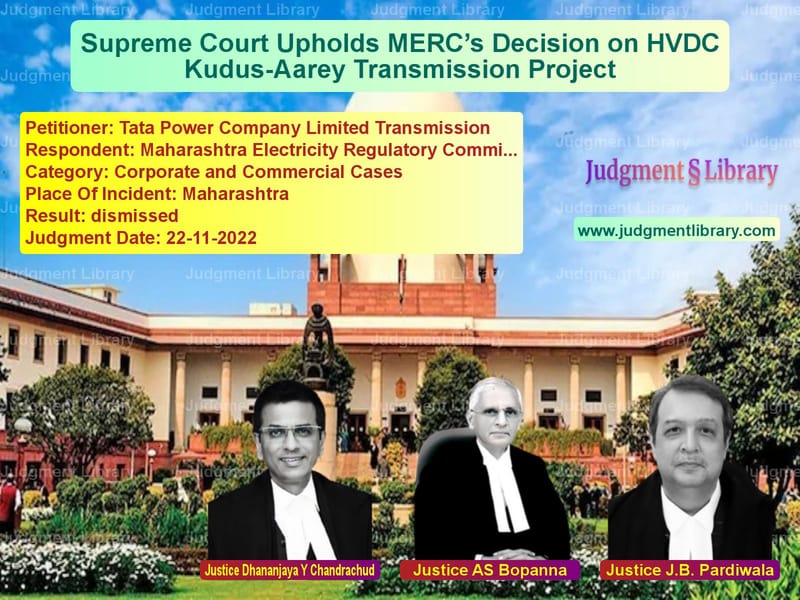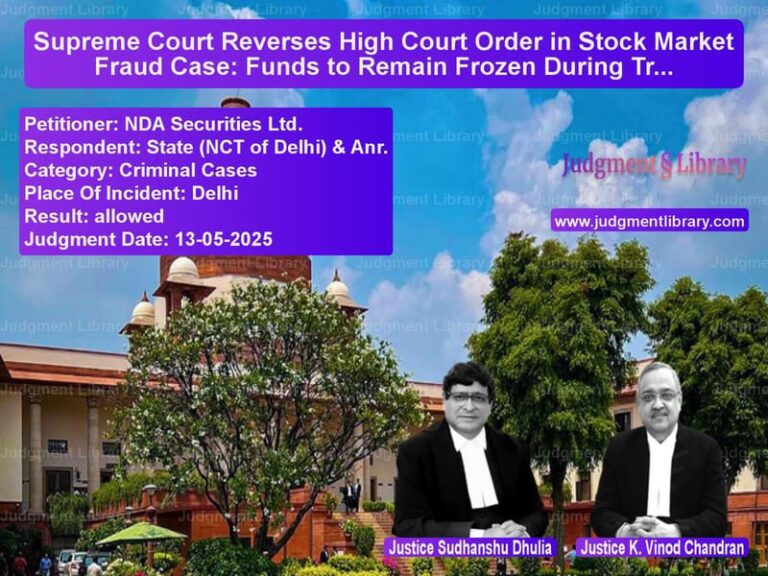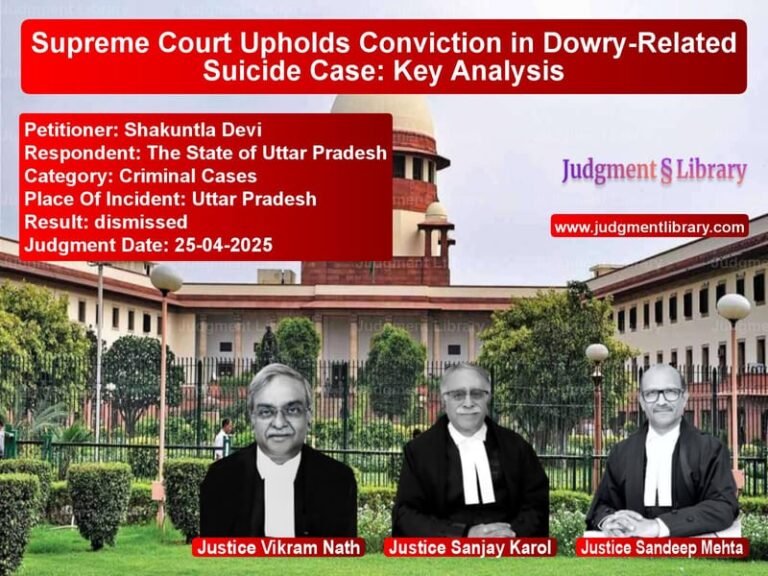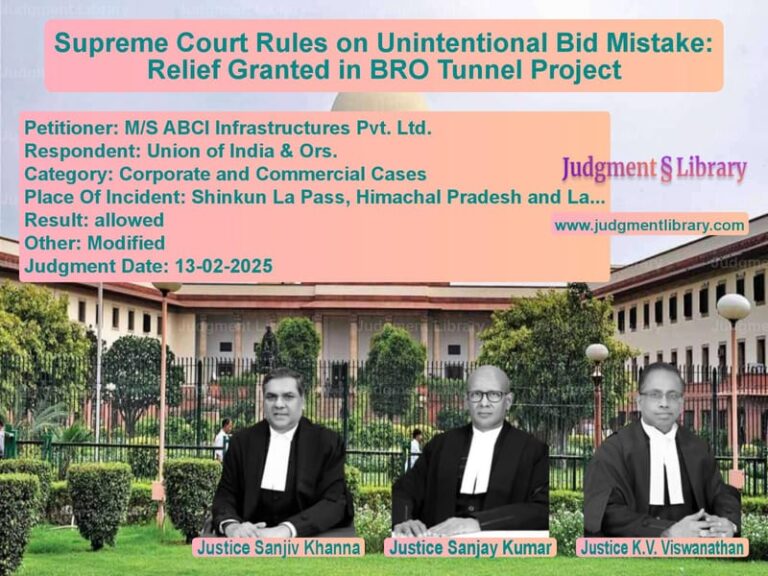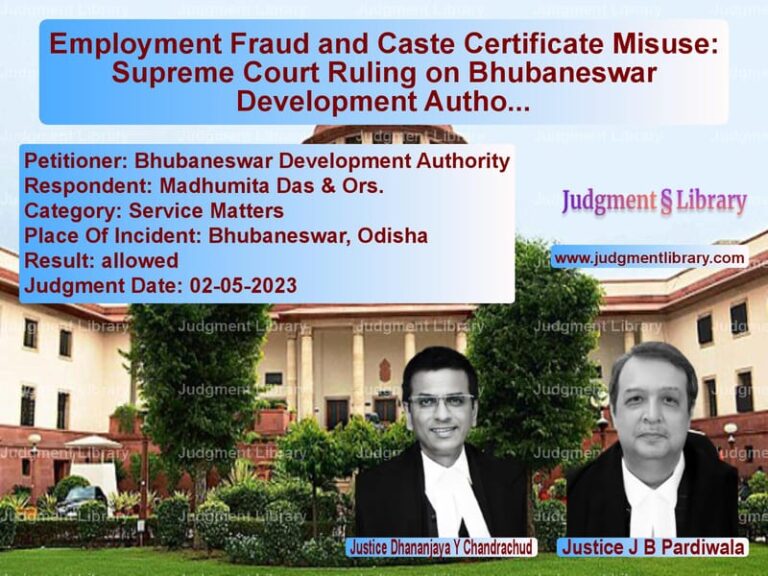Supreme Court Upholds MERC’s Decision on HVDC Kudus-Aarey Transmission Project
The Supreme Court of India recently delivered a significant ruling in the case of Tata Power Company Limited Transmission vs. Maharashtra Electricity Regulatory Commission & Others. The case revolved around the granting of a transmission license to Adani Electricity Mumbai Infra Limited (AEMIL) for the 1000 MW HVDC Kudus-Aarey transmission project under Section 62 of the Electricity Act, 2003. The decision of the Maharashtra Electricity Regulatory Commission (MERC) to approve this project was challenged by Tata Power Company Limited Transmission (TPC-T), which argued that the project should have been awarded through a Tariff-Based Competitive Bidding (TBCB) process as per the Maharashtra Government’s resolution.
Background of the Case
The Kudus-Aarey HVDC transmission project is a crucial component of Mumbai’s power infrastructure. Initially conceptualized in 2007, the project underwent various modifications over the years, including changes in technology and connectivity points. The Maharashtra State Electricity Transmission Company Limited (MSETCL) classified it as a priority project, emphasizing its role in enhancing Mumbai’s power reliability.
In 2019, the Maharashtra Government issued a Government Resolution (GR) mandating that all new transmission projects above a specified capacity should be allocated through TBCB under Section 63 of the Electricity Act. However, MERC approved AEMIL’s proposal under Section 62, which allows tariff determination based on cost-plus principles rather than competitive bidding. This led to the legal challenge by TPC-T.
Key Legal Issues
- Whether the Kudus-Aarey HVDC project was a new or existing project under the Maharashtra Government’s 2019 resolution.
- Whether MERC had the authority to approve the project under Section 62 instead of following the TBCB mechanism under Section 63.
- Whether the Maharashtra Government’s Government Resolution (GR) was binding on MERC.
- Whether the approval process followed by MSETCL and MERC adhered to the principles of transparency and fair competition.
Arguments by the Petitioner (Tata Power Company Limited Transmission)
The petitioner, TPC-T, raised several key contentions:
- The Maharashtra Government’s 2019 GR mandated that all transmission projects exceeding a certain capacity should be awarded through Tariff-Based Competitive Bidding (TBCB).
- The Kudus-Aarey HVDC project should have been considered a new project, as its scope had changed significantly since its original conception.
- MERC’s decision to award the project under Section 62 denied fair competition and violated the principles of National Tariff Policy, 2016, which prioritizes competitive bidding.
- The cost-plus model under Section 62 was disadvantageous to consumers, as it allowed cost overruns to be passed on without competitive price discovery.
- Granting the project to AEMIL without competitive bidding created an unfair advantage and went against the principles of transparency and market competition.
Arguments by the Respondent (Maharashtra Electricity Regulatory Commission & Others)
MERC, MSETCL, and AEMIL countered the claims made by TPC-T:
- The Kudus-Aarey HVDC project was an existing project that had undergone multiple revisions but was not a new project under the 2019 GR.
- Section 62 of the Electricity Act allows tariff determination through cost-plus mechanisms, and MERC exercised its regulatory discretion appropriately.
- The National Tariff Policy, 2016, does not mandate that all projects must be awarded through TBCB; it merely encourages it where feasible.
- The project had been under discussion since 2007, and its necessity had been reaffirmed over the years due to increasing power demand in Mumbai.
- MSETCL, the State Transmission Utility, classified the project as a critical infrastructure upgrade that required timely execution without delays from competitive bidding.
Supreme Court’s Observations
The Supreme Court extensively analyzed the interplay between Section 62 and Section 63 of the Electricity Act, 2003. The key observations were:
“Section 62 and Section 63 provide alternative routes for tariff determination. There is no absolute mandate that all projects must be awarded through TBCB, particularly when the State Commission exercises its discretion based on public interest.”
On the issue of whether the project was new or existing, the Court ruled:
“The Kudus-Aarey project has been in planning since 2007, with modifications over time. While its design has evolved, it remains within the broader framework of planned transmission infrastructure and cannot be treated as an entirely new project requiring TBCB.”
Regarding the binding nature of the Maharashtra Government’s resolution, the Court stated:
“The Government Resolution of 2019 was not issued under Section 108 of the Electricity Act, which empowers the state government to issue binding directions to the State Commission. As such, it does not have overriding authority over MERC’s regulatory powers.”
Judgment Outcome
The Supreme Court dismissed the appeal by TPC-T and upheld MERC’s decision to grant the project under Section 62. The Court directed all State Commissions to formulate clear regulations under Section 181 of the Electricity Act to avoid similar disputes in the future.
Key Takeaways from the Judgment
- Flexibility in Tariff Determination: The ruling confirms that State Commissions have the discretion to choose between Section 62 (cost-plus) and Section 63 (TBCB) mechanisms based on project requirements.
- Government Resolutions Are Not Binding: Unless issued under Section 108, policy resolutions by state governments do not override regulatory autonomy.
- Classification of Projects: The decision clarifies that modifications to old projects do not necessarily make them “new” under competitive bidding policies.
- Judicial Review of Regulatory Decisions: Courts will not interfere in policy-based regulatory decisions unless there is clear arbitrariness or violation of statutory provisions.
Conclusion
The Supreme Court’s decision in the Kudus-Aarey HVDC project case reinforces the principle that regulatory authorities have discretion in tariff determination and project approval mechanisms. The ruling balances the need for efficient power transmission planning with regulatory flexibility, setting a precedent for future disputes in the power sector.
Petitioner Name: Tata Power Company Limited Transmission.Respondent Name: Maharashtra Electricity Regulatory Commission & Ors..Judgment By: Justice Dhananjaya Y Chandrachud, Justice AS Bopanna, Justice J.B. Pardiwala.Place Of Incident: Maharashtra.Judgment Date: 22-11-2022.
Don’t miss out on the full details! Download the complete judgment in PDF format below and gain valuable insights instantly!
Download Judgment: tata-power-company-l-vs-maharashtra-electric-supreme-court-of-india-judgment-dated-22-11-2022.pdf
Directly Download Judgment: Directly download this Judgment
See all petitions in Company Law
See all petitions in Corporate Governance
See all petitions in unfair trade practices
See all petitions in Judgment by Dhananjaya Y Chandrachud
See all petitions in Judgment by A. S. Bopanna
See all petitions in Judgment by J.B. Pardiwala
See all petitions in dismissed
See all petitions in supreme court of India judgments November 2022
See all petitions in 2022 judgments
See all posts in Corporate and Commercial Cases Category
See all allowed petitions in Corporate and Commercial Cases Category
See all Dismissed petitions in Corporate and Commercial Cases Category
See all partially allowed petitions in Corporate and Commercial Cases Category

